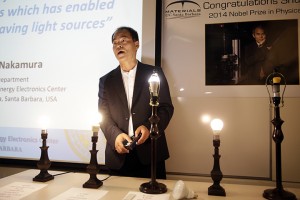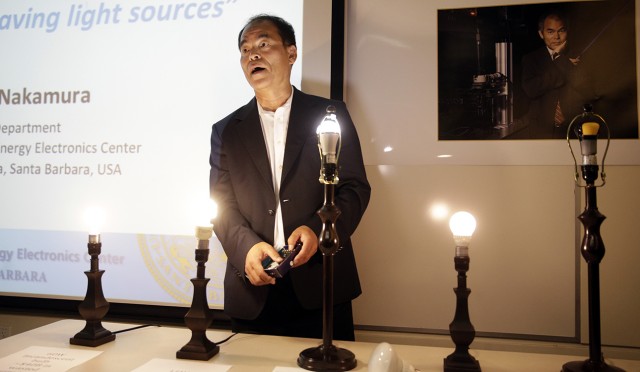
Associated Press
Associated Press
STOCKHOLM — An invention that promises to revolutionize the way the world lights its homes and offices — and already helps create the glowing screens of mobile phones, computers and TVs— earned a Nobel Prize on Tuesday for two Japanese scientists and a Japanese-born American.
By inventing a new kind of light-emitting diode, or LED, they overcame a crucial roadblock for creating white light far more efficiently than incandescent or fluorescent bulbs. Now LEDs are pervasive and experts say their use will only grow.
“Incandescent light bulbs lit the 20th century; the 21st century will be lit by LED lamps,” the Nobel committee said in announcing its award to Japanese researchers Isamu Akasaki and Hiroshi Amano and naturalized U.S. citizen Shuji Nakamura.
Their work, done in the early 1990s, led to a fundamental transformation of technology for illumination, the committee said. And when the three arrive in Stockholm to collect their awards in early December, “they will hardly fail to notice the light from their invention glowing in virtually all the windows of the city.”
Nakamura, 60, is a professor at the University of California, Santa Barbara. Akasaki, 85, is a professor at Meijo University and Nagoya University in Japan, while Amano, 54, is also at Nagoya. Akasaki and Amano made their inventions while working at Nagoya, while Nakamura was working separately at the Japanese company Nichia Chemicals.
At a press conference, Nakamura said he is “happy to see that my dream of LED lighting has become a reality. Nowadays we can buy energy-efficient light bulbs in the supermarket and help reduce energy use. I hope this helps to reduce global warming too,” he said, reading from a prepared statement.
Akasaki told a nationally-televised news conference in Japan that he had faced skepticism about his research bearing fruit. “But I never felt that way,” he said. “I was just doing what I wanted to do.”
Before their work, scientists had long been able to produce red and green light with LEDs. But they needed a blue LED as well to make white light, a goal sought for about 30 years. The three new Nobel laureates created blue LEDs.
For illuminating schools, homes and offices, “it’s quite possible this will change everything. All the light sources could easily become blue-LED-based light sources,” said Mark Rea, director of the Lighting Research Center at the Rensselaer Polytechnic Institute in Troy, New York.
Nadarajah Narendran, director of research at the center, estimated the share of illumination by LED lights in homes, offices, streets and industries is approaching 10 percent in the United States. Within five years, he said, that fraction will probably exceed 30 percent as prices come down.
People can already buy LED lights for their homes at a fairly affordable price, he said.
In poor countries, such lights are replacing alternatives like kerosene lanterns, he said.
“It’s touched (people) from the poor to the rich in a very short time frame,” he said.
The Nobel committee noted that for people not supplied by power grids, LED lamps may be feasible to use with cheap solar power because they consume so little energy.
The committee also said the efficiency of LEDs helps save the Earth’s resources because about one-fourth of world electricity consumption is used for lighting.
Many colleagues of Nick Holonyak Jr., a retired professor from the University of Illinois who invented the red LED in 1962, have long said his work was unjustly overlooked by the Nobel committee.
But on Tuesday, Holonyak said the work done by the new winners was built on achievements by himself and dozens of others who worked with him.
“I find this one insulting,” he said in an interview in Urbana, Illinois.
Last year’s physics award went to British scientist Peter Higgs and Belgian colleague Francois Englert for helping to explain how matter formed after the Big Bang.
On Monday, U.S.-British scientist John O’Keefe split the Nobel Prize in medicine with Norwegian couple May-Britt Moser and Edvard Moser for breakthroughs in brain research that could pave the way for a better understanding of diseases like Alzheimer’s.
The Nobel award in chemistry will be announced Wednesday, followed by the literature award on Thursday, the Nobel Peace Prize on Friday and the economics prize on Monday.
Worth 8 million kronor ($1.1 million) each, the Nobel Prizes are always handed out on Dec. 10, the anniversary of prize founder Alfred Nobel’s death in 1896. Besides the prize money, each laureate receives a diploma and a gold medal.
Nobel, a wealthy Swedish industrialist who invented dynamite, provided few directions for how to select winners, except that the prize committees should reward those who “have conferred the greatest benefit to mankind.”
This year’s physics prize, the Nobel committee said, was given with that idea in mind.



